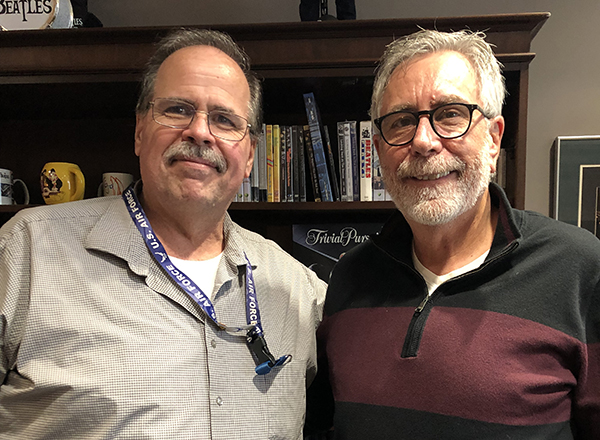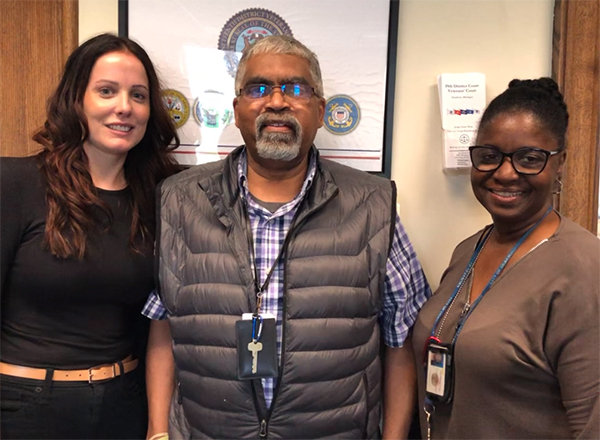Veterans Day: President’s Video and Veterans Court
In this video, President Kavalhuna describes the background of Veterans Day. Student Veterans Jessica James and Michael Palmer share what the holiday means to them. And HFC Trustee Roxanne McDonald shares what the holiday means to her and her family.
Happy Veterans Day!
If you are a veteran student at HFC, we are here to help you.
Learn more about Judge Gene Hunt and the background of the Veterans Court.
Judge Hunt is a U.S. Marine veteran and has spent much of his career helping other veterans.
If you are a military veteran who is interesting in participation as a Mentor within this program, contact Murray Davis, Veteran’s Court Coordinator at veteranscourt@ci.dearborn.mi.us or by calling (313) 943-2281.
The Veterans District Court, established by Judge Eugene Hunt
Veterans Day 2021 is being commemorated at HFC by highlighting the importance of support for military veterans and service members.
As part of the 19th District Court in Dearborn, the Veterans Treatment Court (VTC) is designed to keep veterans with mental health or substance abuse problems out of the traditional criminal justice system by offering them treatment and other rehabilitation options as conditions of their probation.
Established in 2018 by Judge L. Eugene Hunt, Presiding Judge, the VTC functions as a non-traditional problem-solving court focusing on local nonviolent offenders with underlying medical and social problems that have contributed to recurring contacts with the criminal justice system. The Veterans Treatment Court promotes sobriety, recovery, and stability through a coordinated response that involves collaboration with volunteer mentors, community and state-wide partners, along with the VA (Veterans Administration) healthcare administration and its medical centers.
This program helps ensure that no veteran is left behind. It provides a coordinated response and collaboration between community partners to connect veterans with the benefits and treatments they have earned.
Presiding Judge Hunt
When Judge Hunt became Presiding Judge at the 19th District Court, one of the first steps he took was to establish the Veterans Treatment Court in Dearborn as an alternative to the traditional criminal justice system and to provide support, benefits and services to participants.
Judge Hunt, a U.S. Marine Corps veteran, has always had a soft spot for veterans. When Hunt was an attorney and saw a veteran in the courthouse, he would always approach him or her, offering pro bono legal assistance if needed.
“When we established the Veterans Treatment Court in 2018, I was interested in providing this program, but didn’t know how successful it could actually be. I am proud to report that it has been extremely successful. After the initial first months, virtually 100% of the participants embrace the opportunity for this support,” said Hunt.
Upon being honorably discharged from the USMC, Hunt attended HFC and completed coursework in general studies. He transferred to UM-Dearborn and earned his bachelor’s degree in English in 1982. He earned his juris doctor from Wayne State University Law School in 1985. Hunt also completed coursework at California Western University School of Law in San Diego. He taught courses at HFC in the Business and Economics Division.
Hunt has been a practicing attorney for more than 31 years.
“Ever since junior high, I thought about being an attorney. I know it sounds like a trite statement, but it’s true in my case: I’ve wanted to help people. I was good at figuring out ways to help. My law degree provided greater opportunities to do that,” he explained.
Becoming a judge expanded his opportunities even more.
“It’s an extremely rewarding job because you are in contact with so many people,” said Hunt. “When you’re a lawyer, you get to argue your position. When you’re a judge, you get to hear the arguments and make decisions about the right thing to do.”
A probation model that works for veterans
According to Hunt, there are some circumstances under which people can keep criminal charges off their record. If a veteran committed a crime, he or she can sometimes be moved out of the traditional criminal justice system, plead guilty, and receive probation. From there, the Veterans Court administration helps veterans find the services they need so they can successfully complete their probation.
The Veterans Court is connected to Michigan Medicine (University of Michigan) and various community substance abuse programs in the region. The Veterans Court also has a partnership with the University of Michigan-Dearborn to provide education for veterans.
"The Veterans Court extends beyond traditional court services. I have a couple of union partnerships where I can sometimes get training and a job for a veteran,” said Hunt. “Whether they need mental health services, substance abuse services, or healthcare benefits through the VA, our veterans can get access to what they need. If they complete their probation successfully – and it’s a very strict and tight probation – their case is dismissed without a criminal conviction on their record.”
Hunt conceived the idea for Veterans Court when he was running for judge in 2016. He looked at the Veterans Court at the 17th District Court in Redford as a model.
“I was very impressed by Judge Karen Khalil’s handling of that court. I was surprised at all the services that were available to veterans to help them get back on track,” said Hunt.
The Veterans Court isn’t required, however.
“I’ve had veterans come through here and offered them services through the Veterans Court, but some weren’t interested. It is very important to me to meet the needs of people who are willing to do their part. If they’re not interested, I don’t force them into it. I only want to bring people in here who are ready for help. They have to be at a point in their lives where they want to change.”
Opportunity to support veterans:
If a veteran qualifies as a program participant, they work with a Counselor, probation officer and veterans’ mentor who has direct contact with the participant to offer support during the 12-18 month program.
“We’re always looking for good people to help us,” says Judge Hunt. VTC is looking for military veterans who are interested in becoming a mentor to participants of the VTC program. HFC CIS faculty member and military veteran Bob James serves as a mentor to the court.
If you are a military veteran who is interesting in participation as a Mentor within this program, contact: Murray Davis, Veteran’s Court Coordinator at veteranscourt@ci.dearborn.mi.us or by calling (313) 943-2281.
Additional Resources
Dearborn Veterans Center
(313) 277-1428
19855 Outer Drive
Suite105W
Dearborn, MI 48124
Wayne County Veterans Services
(313) 224-5045
Michigan Veterans Affairs Agency
1-800-642-4838 (1-800-MICH-VET)
Veterans Crisis Line
1-800-273-8255
Homeless Veterans Assistance 1-877-424-3838
Special thanks to HFC Veterans Coordinator Gail Bock for coordinating the resources for this website.

